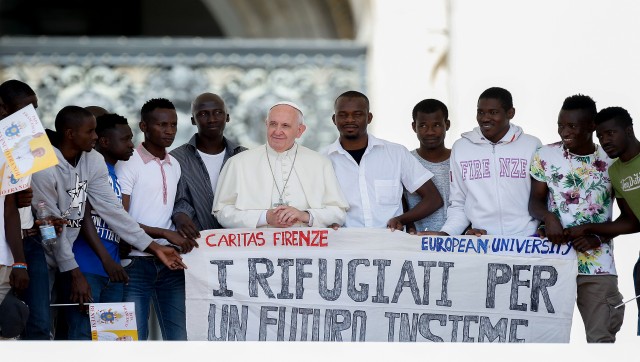Pope Francis is visiting Marseille, a multiethnic and multifaith melting pot for centuries, to underline his demand for the Mediterranean to be a welcoming destination for migrants. It’s a lonely voice in Europe, where some nations are resorting to border barriers, repatriations, and talk of a naval blockade to keep a new surge of would-be migrants out. Francis is presiding over the concluding session of a meeting of Mediterranean Catholic bishops, but his two-day visit, which begins Friday, is intended to convey a message to Europe, North Africa, and beyond. Following a prayer at Marseille’s basilica, Francis leads an ecumenical prayer at a memorial dedicated to people who have perished at sea, a figure predicted to exceed 28,000 since 2014 by the International Organisation for Migration. Francis, who has long bemoaned that the Mediterranean has become “the world’s biggest cemetery,” announced his visit months ago, but it comes as Italy is once again dealing with an influx of migrants arriving in flimsy boats from Tunisia. After the number of people landing on the island of Lampedusa momentarily surpassed the native population of 6,100, Italian Prime Minister Giorgia Meloni reignited calls for a naval blockade and announced additional centres to house those who do not qualify for asylum until they can be returned home. France, for its part, beefed up border patrols at its southern frontier with Italy, a few hours’ drive from Marseille, and increased drone surveillance of the Alps to keep the newcomers from crossing over. With a European Parliament election looming next year and the far-right challenging the centrist government’s line, French government officials stood firm. “France will not take in migrants from Lampedusa,” French Interior Minister Gerald Darmanin said this week on national TF1 television. “It’s not by taking in more people that we’re going to stem a flow that obviously affects our ability to integrate” them into French society, he said. Marseille’s archbishop, Cardinal Jean-Marc Aveline, who himself was born in Algeria and moved to France as a child, said such “aggressive” measures weren’t the answer. But he also said “naïve” and peacenik speeches about everyone living together happily ever after weren’t helpful either. “The church must measure these evils well and find a path that is neither naively irenic nor aggressive out of special interests, but prophetic,” by being close to migrants and living among them, he told reporters in Rome before the visit. Marseille is one of the most multicultural, multireligious and multiethnic cities on the shores of the Mediterranean, long characterized by a strong presence of migrants living together in a tradition of tolerance. France’s INSEE national statistics agency shows that there were more than 124,000 immigrants in a city of 862,000 residents in 2019, or about 14.5% of the population, with almost 30,000 Algerians and thousands from Turkey as well as Morocco, Tunisia and other former French colonies in Africa. “The pope is proposing a path, as others do, whether you’re a believer or not, whether Muslim, Jew, atheist or Catholic,” Marseille Mayor Benoit Payan said. “He’s telling us that we have something in common and that this Mediterranean must be preserved in its biodiversity, of course, but also in its human relationships.” The visit comes on the eve of the Catholic Church’s annual celebration of migrants and refugees, with this year’s theme noting the internationally recognized right to migrate but also the right to not migrate, and to live at home safely and securely. “They choose to leave, but because they did not necessarily have the choice to stay,” Aveline said of this year’s message. “You seldom leave your country with joy in your heart.” And for those who are forced to leave, the Catholic Church has been working with other evangelical churches to provide legal ways for migrants to reach Europe, so-called humanitarian corridors that so far have brought more than 6,000 refugees to Italy. Marco Impagliazzo, head of the Sant’Egidio Community that is helping organize the corridors, said the numbers of migrants arriving by boat in Italy this year are high but by no means constitutes an emergency. Migration, he said, isn’t an emergency but rather “a long-term problem, a structural phenomenon that requires medium and long-term solutions” that could also be of enormous benefit to Italy, given its demographic crisis. Among other things, he proposed increasing the number of humanitarian visas granted and restoring funding for local community programs to teach new migrants Italian — a relatively low-cost investment that is crucial to successfully integrate them into society. Njifon Njiemessa, a student from Cameroon who came to Italy in May in a humanitarian corridor, said he hoped to return one day to Cameroon, but for now, he hoped to integrate into Italy. “If there is any possibility of pushing my studies it will be welcome because my dream, my main dream is to, is still to be useful for those that are back in Cameroon because my mission is to help those that are there,” Njiemessa told reporters.
Marseille is one of the most multicultural, multireligious and multiethnic cities on the shores of the Mediterranean, long characterized by a strong presence of migrants living together in a tradition of tolerance
Advertisement
End of Article


)

)
)
)
)
)
)
)
)



